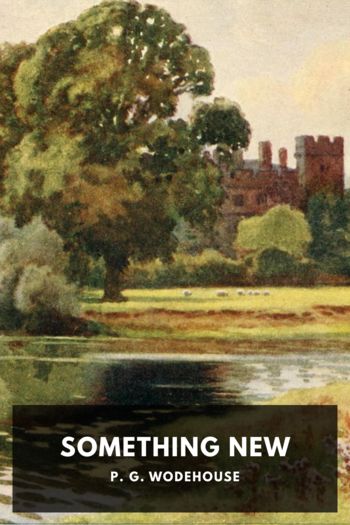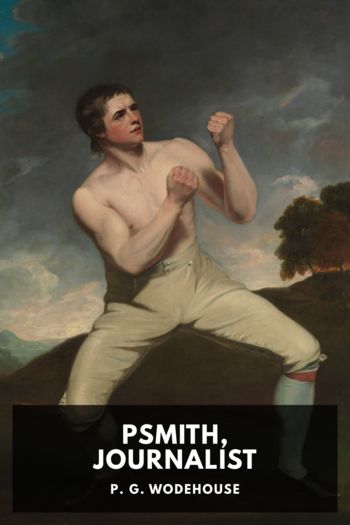Leave It to Psmith - P. G. Wodehouse (i wanna iguana read aloud .TXT) 📗

- Author: P. G. Wodehouse
Book online «Leave It to Psmith - P. G. Wodehouse (i wanna iguana read aloud .TXT) 📗». Author P. G. Wodehouse
“I would prefer, if you do not mind,” said Psmith, “to remain here for the moment and foster what I feel sure is about to develop into a great and lasting friendship. I am convinced that your son and I will have much to talk about together.”
“Very well, my dear fellow. We will meet at dinner in the restaurant-car.”
Lord Emsworth pottered off, and Psmith rose and closed the door. He returned to his seat to find Freddie regarding him with a tortured expression in his rather prominent eyes. Freddie’s brain had had more exercise in the last few minutes than in years of his normal life, and he was feeling the strain.
“I say, what?” he observed feebly.
“If there is anything,” said Psmith kindly, “that I can do to clear up any little difficulty that is perplexing you, call on me. What is biting you?”
Freddie swallowed convulsively.
“I say, he said your name was McTodd!”
“Precisely.”
“But you said it was Psmith.”
“It is.”
“Then why did father call you McTodd?”
“He thinks I am. It is a harmless error, and I see no reason why it should be discouraged.”
“But why does he think you’re McTodd?”
“It is a long story, which you may find tedious. But, if you really wish to hear it …”
Nothing could have exceeded the raptness of Freddie’s attention as he listened to the tale of the encounter with Lord Emsworth at the Senior Conservative Club.
“Do you mean to say,” he demanded at its conclusion, “that you’re coming to Blandings pretending to be this poet blighter?”
“That is the scheme.”
“But why?”
“I have my reasons, Comrade—what is the name? Threepwood? I thank you. You will pardon me, Comrade Threepwood, if I do not go into them. And now,” said Psmith, “to resume our very interesting chat which was unfortunately cut short this morning, why do you want me to steal your aunt’s necklace?”
Freddie jumped. For the moment, so tensely had the fact of his companion’s audacity chained his interest, he had actually forgotten about the necklace.
“Great Scott!” he exclaimed. “Why, of course!”
“You still have not made it quite clear.”
“It fits splendidly.”
“The necklace?”
“I mean to say, the great difficulty would have been to find a way of getting you into the house, and here you are, coming there as this poet bird. Topping!”
“If,” said Psmith, regarding him patiently through his eyeglass, “I do not seem to be immediately infected by your joyous enthusiasm, put it down to the fact that I haven’t the remotest idea what you’re talking about. Could you give me a pointer or two? What, for instance, assuming that I agreed to steal your aunt’s necklace, would you expect me to do with it, when and if stolen?”
“Why, hand it over to me.”
“I see. And what would you do with it?”
“Hand it over to my uncle.”
“And whom would he hand it over to?”
“Look here,” said Freddie, “I might as well start at the beginning.”
“An excellent idea.”
The speed at which the train was now proceeding had begun to render conversation in anything but stentorian tones somewhat difficult. Freddie accordingly bent forward till his mouth almost touched Psmith’s ear.
“You see, it’s like this. My uncle, old Joe Keeble …”
“Keeble?” said Psmith. “Why,” he murmured meditatively, “is that name familiar?”
“Don’t interrupt, old lad,” pleaded Freddie.
“I stand corrected.”
“Uncle Joe has a stepdaughter—Phyllis her name is—and some time ago she popped off and married a cove called Jackson …”
Psmith did not interrupt the narrative again, but as it proceeded his look of interest deepened. And at the conclusion he patted his companion encouragingly on the shoulder.
“The proceeds, then, of this jewel-robbery, if it comes off,” he said, “will go to establish the Jackson home on a firm footing? Am I right in thinking that?”
“Absolutely.”
“There is no danger—you will pardon the suggestion—of you clinging like glue to the swag and using it to maintain yourself in the position to which you are accustomed?”
“Absolutely not. Uncle Joe is giving me—er—giving me a bit for myself. Just a small bit, you understand. This is the scheme. You sneak the necklace and hand it over to me. I push the necklace over to Uncle Joe, who hides it somewhere for the moment. There is the dickens of a fuss, and Uncle Joe comes out strong by telling Aunt Constance that he’ll buy her another necklace, just as good. Then he takes the stones out of the necklace, has them reset, and gives them to Aunt Constance. Looks like a new necklace, if you see what I mean. Then he draws a cheque for twenty thousand quid, which Aunt Constance naturally thinks is for the new necklace, and he shoves the money somewhere as a little private account. He gives Phyllis her money, and everybody’s happy. Aunt Constance has got her necklace, Phyllis has got her money, and all that’s happened is that Aunt Constance’s and Uncle Joe’s combined bank balance has had a bit of a hole knocked in it. See?”
“I see. It is a little difficult to follow all the necklaces. I seemed to count about seventeen of them while you were talking, but I suppose I was wrong. Yes, I see, Comrade Threepwood, and I may say at once that you can rely on my cooperation.”
“You’ll do it?”
“I will.”
“Of course,” said Freddie awkwardly, “I’ll see that you get a bit all right. I mean …”
Psmith waved his hand deprecatingly.
“My dear Comrade Threepwood, let us not become sordid on this glad occasion. As far as I am concerned, there will be no charge.”
“What! But look here …”
“Any assistance I can give will be offered in a purely amateur spirit. I would have mentioned before, only I was reluctant to interrupt you, that Comrade Jackson is my boyhood chum, and that Phyllis, his wife, injects into my life the few beams of sunshine that illumine its dreary round. I have long desired to do something to ameliorate their lot, and now that the chance has come I am delighted. It is true that I





Comments (0)